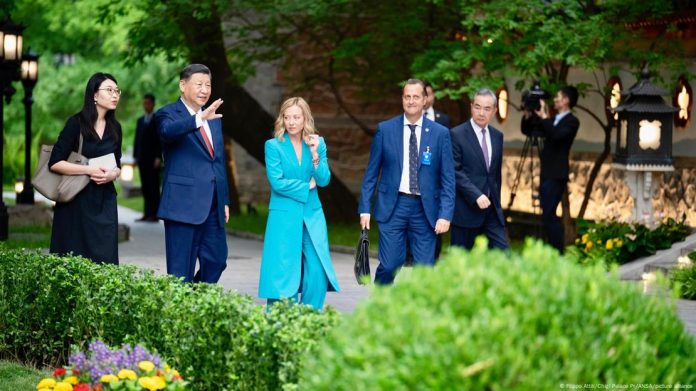Italian Prime Minister Giorgia Meloni and Chinese President Xi Jinping discussed “priority issues on the international agenda, from the war in Ukraine to the risks of further escalation in the Middle East,” Meloni’s office said in a statement.
During Monday’s talks, it said:
“They also discussed growing tensions in the Indo-Pacific.”
Meloni kicked off her trip by signing a trade agreement with Chinese Prime Minister Li Qiang. China is an “important interlocutor” internationally, Meloni said.
Meloni and Xi held talks at Beijing’s Diaoyutai State Guesthouse on Monday. The Italian leader said China plays an important diplomatic role in the world. Meloni told Xi:
“There is growing insecurity at the international level and I think that China is inevitably a very important interlocutor to address all these dynamics.”
China organised talks earlier this month between rival Palestinian factions Hamas and Fatah that resulted in both groups agreeing to form a “provisional government of national reconciliation” to govern post-war Gaza, according to China’s foreign minister.
Xi, meanwhile, hailed the “long-established friendly” ties between Beijing and Rome. He said:
“Both sides uphold tolerance, mutual trust and mutual respect, with each choosing its own development path.”
Meloni’s office said the pair also discussed other pressing global issues such as artificial intelligence, climate change and plans to reform the UN Security Council, where China has veto power.
Meloni aims to rebuild bridges
Italy’s right-wing prime minister is making her first trip to China since taking office two years ago. Early in her tenure, she pulled Italy away from its planned participation in China’s massive Belt and Road Initiative, an international infrastructure and infrastructure development project.
Italy was far from the only European country involved in the project in some capacity, as Austria, Poland, Hungary, the Czech Republic, Bulgaria and others remain in the plans. But Meloni’s decision put Rome in line with other major Western European powers such as France, Germany, Spain and Britain, which have so far refused to participate.
In talks with Chinese Premier Li Qiang on Sunday, Meloni said his visit was aimed at “renewing our bilateral co-operation.”
The pair then signed a bilateral action plan on future trade and other issues that emphasises the importance of “ensuring balanced and mutually beneficial commercial relations,” as Meloni put it.
The document says it aims to ensure that “companies can operate on a level playing field in the spirit of fair competition and free trade.”
Attempts to find peace in Ukraine
Chinese President Xi Jinping has recently stepped up efforts to position himself as a peacemaker for ending the military conflict in Ukraine, despite growing criticism from the US and Europe.
China has also offered to mediate talks between Ukraine and Russia to end the Ukrainian conflict. But the offer has sparked scepticism in the West, including recent US accusations that Beijing is effectively supporting Moscow’s military action with some key exports.
Meloni told Xi that Italy and China should “think together about how to guarantee stability, how to guarantee peace.” She said:
“Above all we need the system of rules in which we operate to remain stable.”
As Moscow and Kyiv face pressure at home and abroad to find a way to end the war, China last week hosted its first senior official from Ukraine since the conflict began in 2022. While Foreign Minister Wang Yi told his Ukrainian counterpart Dmytro Kuleba that the time for peace talks was “not ripe,” he said both sides were now signalling a willingness to negotiate.
Beijing continued this on Sunday, sending its special envoy Li Hui to Brazil, South Africa and Indonesia to “create conditions for the resumption of peace talks” – countries that also missed out on US-led sanctions against Russia.
The flurry of activity underlines Xi’s desire to strengthen his diplomatic role at a time when Kyiv and the wider European region are expecting dramatic changes in the foreign policy of its most important ally. Republican candidate Donald Trump has vowed to end the war in Ukraine “within 24 hours” if he wins the US election, while his vice-presidential candidate J.D. Vance has criticised Beijing’s support for Kyiv.
Beijing’s appeal came after President Volodymyr Zelensky’s government announced it was open to Russian leader Vladimir Putin’s participation in a second peace summit planned before the US vote in November, a condition for Beijing’s participation.
